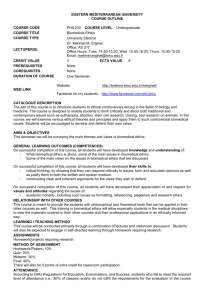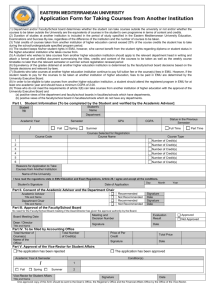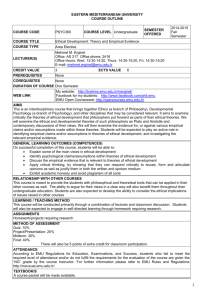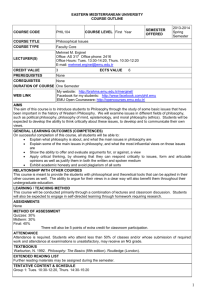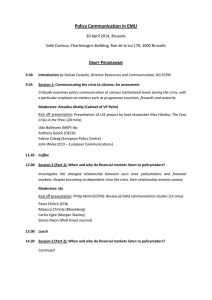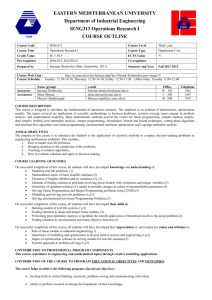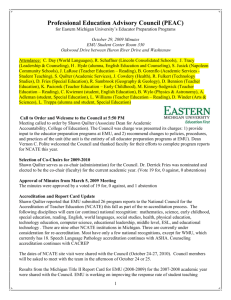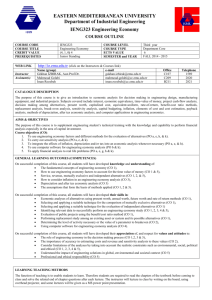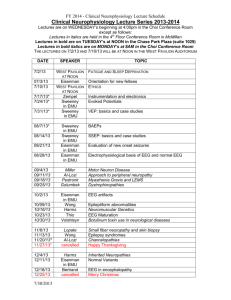PHIL403 - Eastern Mediterranean University
advertisement
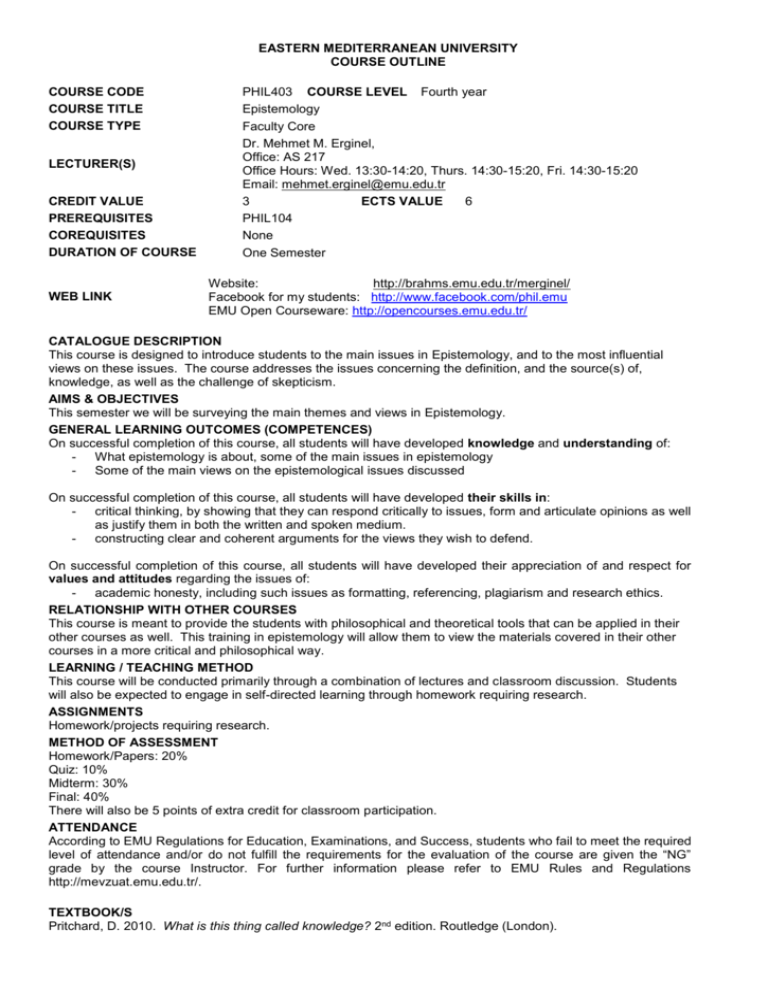
EASTERN MEDITERRANEAN UNIVERSITY COURSE OUTLINE COURSE CODE COURSE TITLE COURSE TYPE LECTURER(S) CREDIT VALUE PREREQUISITES COREQUISITES DURATION OF COURSE WEB LINK PHIL403 COURSE LEVEL Fourth year Epistemology Faculty Core Dr. Mehmet M. Erginel, Office: AS 217 Office Hours: Wed. 13:30-14:20, Thurs. 14:30-15:20, Fri. 14:30-15:20 Email: mehmet.erginel@emu.edu.tr ECTS VALUE 3 6 PHIL104 None One Semester Website: http://brahms.emu.edu.tr/merginel/ Facebook for my students: http://www.facebook.com/phil.emu EMU Open Courseware: http://opencourses.emu.edu.tr/ CATALOGUE DESCRIPTION This course is designed to introduce students to the main issues in Epistemology, and to the most influential views on these issues. The course addresses the issues concerning the definition, and the source(s) of, knowledge, as well as the challenge of skepticism. AIMS & OBJECTIVES This semester we will be surveying the main themes and views in Epistemology. GENERAL LEARNING OUTCOMES (COMPETENCES) On successful completion of this course, all students will have developed knowledge and understanding of: - What epistemology is about, some of the main issues in epistemology - Some of the main views on the epistemological issues discussed On successful completion of this course, all students will have developed their skills in: - critical thinking, by showing that they can respond critically to issues, form and articulate opinions as well as justify them in both the written and spoken medium. - constructing clear and coherent arguments for the views they wish to defend. On successful completion of this course, all students will have developed their appreciation of and respect for values and attitudes regarding the issues of: - academic honesty, including such issues as formatting, referencing, plagiarism and research ethics. RELATIONSHIP WITH OTHER COURSES This course is meant to provide the students with philosophical and theoretical tools that can be applied in their other courses as well. This training in epistemology will allow them to view the materials covered in their other courses in a more critical and philosophical way. LEARNING / TEACHING METHOD This course will be conducted primarily through a combination of lectures and classroom discussion. Students will also be expected to engage in self-directed learning through homework requiring research. ASSIGNMENTS Homework/projects requiring research. METHOD OF ASSESSMENT Homework/Papers: 20% Quiz: 10% Midterm: 30% Final: 40% There will also be 5 points of extra credit for classroom participation. ATTENDANCE According to EMU Regulations for Education, Examinations, and Success, students who fail to meet the required level of attendance and/or do not fulfill the requirements for the evaluation of the course are given the “NG” grade by the course Instructor. For further information please refer to EMU Rules and Regulations http://mevzuat.emu.edu.tr/. TEXTBOOK/S Pritchard, D. 2010. What is this thing called knowledge? 2nd edition. Routledge (London). INDICATIVE BASIC READING LIST NONE EXTENDED READING LIST Extra readings may be assigned during the semester. SEMESTER OFFERED Fall 2014 CONTENT & SCHEDULE Lectures will be held at the following hours: Group 01: Mon. 10:30-12:20, Thurs. 11:30-12:20 Group 02: Wed. 10:30-12:20, Thurs. 14:30-15:20 The lecture topics within the semester are as in the following schedule: WEEK 1 2 3 4 5 6 7 8 9-10 11 12 13 14 15 16 17-18 DATE Oct. 13 Oct. 20 Oct. 27 Nov. 3 Nov. 10 Nov. 17 Nov. 11 Nov. 24 Nov. 28-Dec. 9 Dec. 10 Dec. 15 Dec. 22 Dec. 29 Jan. 5 Jan. 12 19-31 Jan. TOPICS Introduction and orientation The Value of Knowledge Defining Knowledge The Structure of Knowledge Rationality Virtues and Faculties Virtues and Faculties/Perception Perception Midterm Exam Period A priority and Inference A priority and Inference/The Problem of Induction The Problem of Induction Scepticism Scepticism Wrap-up and Review Final Exam Period ACADEMIC DISHONESTY Academic dishonesty refers to any form of misrepresentation of student abilities, including, but not limited to, cheating on exams, plagiarism, and submitting work that has been composed, translated and/or substantially edited by someone else. Please refer to the Eastern Mediterranean University web site for a complete description of the Regulations for Student Discipline (http://mevzuat.emu.edu.tr/). MAKE-UP POLICY Within a few days after the final exam there will be a make-up exam, for people who missed either the midterm exam or the final exam with legitimate and documented excuses. In order to be able to take the cumulative make-up exam, valid documentation should be provided to the Psychology Department Administration within 3 days of the scheduled exam that is missed. It is students’ responsibility to check with the Psychology department for the make-up schedule. ASSIGNMENT DEADLINES No extensions will be granted on assignment deadlines. Late work will not be accepted. CLASSROOM POLICIES Students must come to class on time – coming in late is disruptive and will not be tolerated. All requests for grade re-evaluations on exams, quizzes and class assignments must be made within three days of grade notification. There are no re-evaluations of previous work (i.e., exams, quizzes or class assignments) after final point calculations are posted at the end of the semester. Final grades are assigned solely based on points earned during the semester. Please make sure to read the complete set of classroom policies described in the Departmental Catalogue on the Psychology Departmental Website: http://brahms.emu.edu.tr/psychology
